What is 'Decolonisation'? - How do we Decolonise?
Until we as First Nations and Peoples decolonise our minds we as Aboriginal people will never truly achieve liberation and our problems we face today will persist. Until our thinking changes we will continue to identify with European culture and undermine and doubt our own culture, the oldest and most sustainably developed culture on earth.
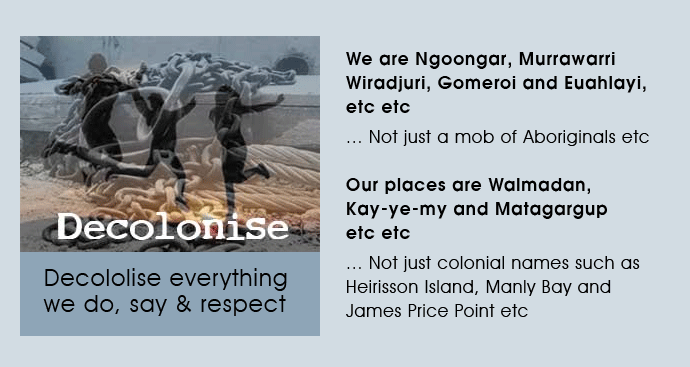
Defining Decolonisation
One of the basic fundamental facets to achieve true decolonisation, that is, we must learn to decolonise our minds. This essentially means that we must stop thinking like our oppressor and thereby stop trying to fit a round peg in a square hole.
I say this because every time we talk about progressing forward in our ambition to achieve self-determination and independence, too often our people revert to saying: We have to ask the government, or we need to ask them for money.
Our people also exhibit the *Stockholm Syndrome, in which case our people become conflicted because they think that by being friendly though developing partnerships they can become equal to their oppressor ...
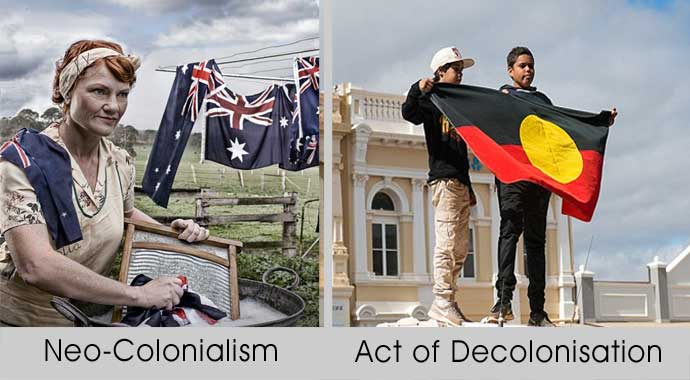
Proudly flying the flag is a strong act of Decolonisation but it is only a beginning, Decolonisation is changing the way you think, changing your habits and following your inherited culture in every way you can. After a lifetime of colonial indoctrination it is extremely difficult for many of our people to throw off the effects of colonisation, but until this achieved you will always be a slave of British colonialism and will never achieve liberation.
Ghillar, Michael Anderson, 10 October 2016
The International Consultative Preparatory Forum (ICPF) for
Decolonising: 2017 Pacific Alliance Gathering of Colonised Peoples & Sovereign Peoples Union for Global Justice through Decolonisation and Reparations:
The Sovereign Union is now picking up the pace towards decolonisation, self-determination and independence for First Nations within Australia, while linking and forging international alliances with the shared experiences of other First Nations on and adjacent to the Pacific Rim and others who have been impacted by the scourge of colonialism. An example of 'others' is the descendants of slavery referred to as the international diaspora, who like the Rroma, Romany, are now stateless and without a land base of their own.
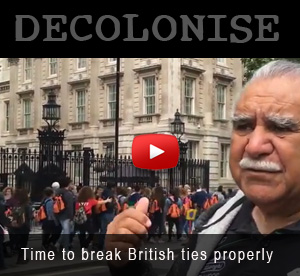
In the case of Australia we have the descendants of the Kanaka, who were enslaved by the British and foreign sugar cane companies, from which the slave owners gained enormous wealth. In the case of the 'Italo', Italian sugar cane cutters, who came to Australia as destitute refugees whose country had been ravaged by World War II, their arrival to Australia was timely because slavery was no longer acceptable. The 'Italo' workers filled the void left by the forceful deportation of hundreds of Kanaka, Chinese and other people of colour during the 1930s and 1940s. The 'Italo' Australians knew from their own experiences in Italy how to combine their incomes to break free from domination and dependency. They pooled their monies and ultimately became the owners of the farms they had worked on and thus became economically independent. Through this economic independence they developed influence and political power within Australia.
The move for First Nations to assert independence and the liabilities that will come in terms of self-government now need to be understood. Asserting sovereignty comes with the need to have established a process of self-government. Many First Nations, within and without Australia, have these desires, but do need to understand much more about asserting sovereignty and the methods by which a First Nation attains independence and self-determination in the modern era. We also need to understand that our invader oppressor State will defend itself by using 'all means possible' including their appointed judges, who must uphold the skeletal framework of the colonial regime and its power structure. This means the judges must locate and apply as many legal terminologies within the British common law system as they can to twist their arguments that permit them to defend themselves against our non-violent legal challenges. I describe below another legal doctrine of the British common law that we have not yet examined in full, so as to understand how it can be used against us.
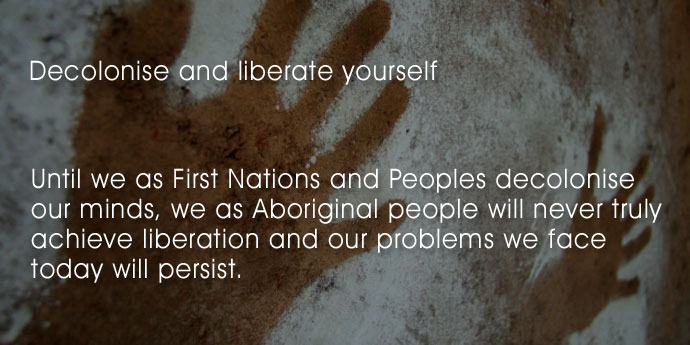
Until our thinking changes we will continue to identify with European culture and undermind and doubt our own culture, the oldest culture on earth.
Firstly, I feel the need to focus on something very important for many of our people in Australia and other First Nations brothers and sisters in other parts of the world.
When the original invasion occurred many of our Peoples lived on and within our homelands and waters, not realising or having any notion of the fact that someone had come with objective of laying claim to the ownership over our all of our Country, territories and waters that we all occupied. Our ancestors had no idea of the fact that these strange pale faced, white-skinned people with their strange clothing and animals, e.g. horses, were not only wandering through our lands uninvited, but were in fact exploring our Country for convenient locations to set up their own bases in the future. Our First Nations Peoples were completely oblivious to what this was all about. I am sure that had our people had any notion of what the intruders were doing at that time they would have killed them for sure.
In the case of Canada, the United States and New Zealand the First Nations had the population size to unite and fight the invaders on their borders. This might of resistance forced England and France, in the case of the USA and Canada, to negotiate Peace Pacts/settlements, which were called Treaties, even though they were only contracts, which can be and were breached, thus nullifying the terms of the whole contract. This has now been proven by the successful Supreme Court cases in the United States taken by First Nations, e.g. the Fort Laramie Treaty over the theft of gold from the Lakota Oglala Sioux Nations of the Black Hills of Dakota.
In the cases of some North American and Canadian Treaties, the dominant occupying power set up an integrated relationship of domestic sovereignty, within the defined Indian Reserves. Some have advanced economically while others continue to be devastated by disadvantage and impoverishment, which, when analysed, comes from the fact that they continue to resist foreign domination, despite the 'Treaty' agreements.
In other regions of the world many First Nations Peoples have never relinquished their sovereignty over their lands and Peoples, in any shape or form, and continue to this day to argue their rights as distinctive First Nations, who have retained sovereign integrity under their own Law, cultures and customs, but have become impoverished and dependent, because of the scourge of colonialism.
"This is not the first time that people have engaged on the issue of decolonisation. Our first step is to engage with our history – our real history. Not just what Australia says about us, but what we say about ourselves."
Our invaders' societies know how to run very successful campaigns against First Peoples, because the oppressors' success is achieved through of our Peoples' lack of understanding of the colonisers' illegalities and dishonest ways of governing. First Peoples resist the oppressors' overtures of assimilation, while the resisters seek to maintain the integrity of their own sovereign national identity, and forge solutions for their liberation from the occupying State and its forces of oppression.
It is now time to define and identify what a movement for decolonisation and self-determination truly means. This can be best done by what has already happened successfully around the world. The following information is a descriptive narrative of decolonisation and what self-determination leads to. There are now many discourses on pathways to decolonisation but Wikipedia provides a simplified introduction. Wikipedia merely gives an insight and overview of these terminologies and I recommend to all our First Nations Peoples at home and around the world to seek legal and international definitions and pathways that will suit their own needs and experiences.
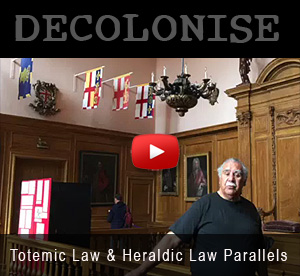
Before focusing your attention on these definitions it is important to understand that countries, such as Canada, New Zealand, Australia and many Pacific Islands remain, to a large degree extended colonial States of Britain.
In all these cases, it is said that after the second world war a process of decolonisation has successfully occurred, but that only applies to the invaders' citizenship and NOT to the native Peoples. Our native First Nation Peoples continue to be subjected to domination under oppressive political regimes, which exercise domination and force through excessive over-policing of our communities. If we were truly part of the invader society this ongoing terrorism and subjugation would not be tolerated. The silent and cold war that we are experiencing is proven when we examine the brutal statistics of incarceration; death; suicide; ill-health; under education; denial of cultural teachings; denial of maintenance of our own languages; the right to our own national identity; economic independence; and so the list goes on.
So we must ask ourselves: Where do we fit and what is really happening to our Peoples?
One thing is for certain our welfare dependency is not a voluntary choice by our Peoples. This was imposed and is maintained to ensure the continued marginalisation of our Peoples from the mainstream economics. In the case of Australia, when Land Rights was fought and won, and land was also returned through the native title process and land acquisition under the Indigenous Land Corporation (ILC), we now find that we cannot use this land under Australian law for our own successful economic purposes.
Let me tell you how Decolonisation can be fast-tracked: we need to unlearn certain behaviours and thoughts. We need to shift our consciousness beyond this immediate reality. We need to shift our consciousness to catch up with our imaginations, because if we are still imagining ourselves in the same space, thinking the same things, nothing is going to change."
With this being the case, then our Sovereignty Movement is a mechanism and process, by which we can achieve our liberation, but to achieve this our Peoples must learn and understand what decolonisation and self-determination mean in practice. Moreover, it is imperative that our people get to understand what their legal and international Human Rights are and it is equally important to identify where and how the mind had been colonised and to actively decolonise one's own thinking.
Without this knowledge we are firing blanks into the night skies. Being dependent on welfare and the fear of welfare payments being taken away is to have your mind imprisoned and controlled. Our independence and our right to own our lands and to maintain sovereign ownership over our natural resources is a pathway to clearing our minds and freeing ourselves from the scourge of this deceitful and covert colonial rule.

Image: Serwah at social space 'Intersection' Photo by Elizabeth Jarrett. Source: Facebook: DECOLONISE
"We are tired. We are angered and we cannot continue to live and learn in a space that denies us of our inherited existence. We cannot continue to be treated as merely anonymous people without a history, because we have a history. And that history did not begin when the colonialisers robbed us of our dignity. It did not begin when they cornered us with their guns and stole our land. It did not begin with colonialism ..."
From Wikipedia 'decolonisation' is described as:
The United Nations Special Committee on Decolonization has stated that in the process of decolonization there is no alternative to the colonizer allowing a process of self-determination,[3] but in practice decolonization may involve either nonviolent revolution or national liberation wars by pro-independence groups. It may be intramural or involve the intervention of foreign powers acting individually or through international bodies such as the United Nations. Although examples of decolonization can be found as early as the writings of Thucydides, there have been several particularly active periods of decolonization in modern times. These include the breakup of the Spanish Empire in the 19th century; of the German, Austro-Hungarian, Ottoman, and Russian Empires following World War I; of the British, French, Dutch, Japanese, Portuguese, Belgian and Italian colonial empires following World War II; and of the Soviet Union (successor to the Russian Empire)[4] following the Cold War.
Methods and stages
Decolonization is a political process and vital internalization of the rejection of colonialist mindsets and "norms." In extreme circumstances, there is a war of independence, sometimes following a revolution. More often, there is a dynamic cycle where negotiations fail, minor disturbances ensue resulting in suppression by the police and military forces, escalating into more violent revolts that lead to further negotiations until independence is granted. In rare cases, the actions of the pro-independence movements are characterized by nonviolence, with the Indian independence movement led by Mohandas Karamchand Gandhi being one of the most notable examples, and the violence comes as active suppression from the occupying forces or as political opposition from forces representing minority local communities who feel threatened by the prospect of independence. For example, there was a war of independence in French Indochina, while in some countries in French West Africa (excluding the Maghreb countries) decolonization resulted from a combination of insurrection and negotiation. The process is only complete when the de facto government of the newly independent country is recognized as the de jure sovereign state by the community of nations.
Independence is often difficult to achieve without the encouragement and practical support from one or more external parties. The motives for giving such aid are varied: nations of the same ethnic and/or religious stock may sympathize with the people of the country, or a strong nation may attempt to destabilize a colony as a tactical move to weaken a rival or enemy colonizing power or to create space for its own sphere of influence; examples of this include British support of the Haitian Revolution against France, and the Monroe Doctrine of 1823, in which the United States warned the European powers not to interfere in the affairs of the newly independent states of the Western Hemisphere.
As world opinion became more pro-independence following World War I, there was an institutionalized collective effort to advance the cause of decolonization through the League of Nations. Under Article 22 of the Covenant of the League of Nations, a number of mandates were created. The expressed intention was to prepare these countries for self-government, but are often interpreted as a mere redistribution of control over the former colonies of the defeated powers, mainly the German Empire and the Ottoman Empire. This reassignment work continued through the United Nations, with a similar system of trust territories created to adjust control over both former colonies and mandated territories.
In referendums, some colonial populations have chosen to retain their colonial status, such as Gibraltar and French Guiana. There are even examples, such as the Falklands War, in which an Imperial power goes to war to defend the right of a colony to continue to be a colony. Colonial powers have sometimes promoted decolonization in order to shed the financial, military and other burdens that tend to grow in those colonies where the colonial governments have become more benign.
Decolonization is rarely achieved through a single historical act, but rather progresses through one or more stages of decolonization, each of which can be offered or fought for: these can include the introduction of elected representatives (advisory or voting; minority or majority or even exclusive), degrees of autonomy or self-rule. Thus, the final phase of decolonisation may, in fact, concern little more than handing over responsibility for foreign relations and security, and soliciting de jure recognition for the new sovereignty. But, even following the recognition of statehood, a degree of continuity can be maintained through bilateral treaties between now equal governments involving practicalities such as military training, mutual protection pacts, or even a garrison and/or military bases.
In my research I have come cross an important word that crystallises colonial domination over others, but more importantly how it is practised in Australia. It is 'suzrainty' and the concept is easily introduced by its legal definition as:
- A sovereign or state having some control over another state that is internally autonomous.
- A feudal overlord. /sup>
[Oxford legal definition]
Wikipedia states that:
When the Australian High Court ruled in Mabo (No.2) that Australia's land law is still a feudal system, in which the Crown asserts ownership and title to ALL of our Country, it created a complicated legal terminology that not only related to a land system, but also placed us as Peoples, into a category unheard of before. That is, the High Court of Australia re-defined us as subservient minorities, who could attract certain rights subject to the will of our oppressive colonisers and not through our sovereign inherited rights as First Nations. This is despite the High Court itself ruling that our Law and customs had survived British invasion. The use of the term 'Feudal' by the High Court in Mabo (No.2) is what established this new definition, even though the judges knew that the feudal system and its related land tenure was made obsolete in Britain in 1660.
Our people now need to understand what a vassel is:
- A holder of land by feudal tenure on conditions of homage and allegiance.
- A person or country in a subordinate position to another. [Oxford legal definition]
Or according to Wikipedia:
If we now look at the Indigenous Land Corporation (ILC) and the Native Title Act 1993 as amended in 1998, our people must realise that according to these laws 'Traditional Owners' cannot own the land that they acquire, because it falls under the British feudal land system and is called an 'Escheat'. A legal definition of 'escheated property' is:
- the reversion of lands in English feudal law to the lord of the fee when there are no heirs capable of inheriting under the original grant
- the reversion of property to the crown in England
[Oxford legal definition]
In respect to understanding the invader society and the colonised Native Peoples, it is important to know that:
The dominant entity in the suzerainty relationship, or the more powerful entity itself, is called a suzerain. The term suzerainty was originally used to refer to the relationship between the Ottoman (Turkey) Empire and its surrounding regions. It differs from sovereignty in that the tributary (the invaded Native People) enjoys some (often limited) self-rule.
A suzerain can also refer to a feudal lord (Britain), to whom vassals must pay tribute. Although it is a concept that has existed in a number of historical empires, it is a concept considered difficult to reconcile with 20th- or 21st- century concepts of international law, in which sovereignty either exists or does not. While a sovereign nation can agree by treaty to become a protectorate of a stronger power, modern international law does not recognize any way of making this relationship compulsory on the weaker power. [Wikipedia]
There is another basic fundamental facet to achieve true decolonisation, that is, we must learn to decolonise our minds. This essentially means that we must stop thinking like our oppressor and thereby stop trying to fit a round peg in a square hole. I say this because every time we talk about progressing forward in our ambition to achieve self-determination and independence, too often our people revert to saying: We have to ask the government, or we need to ask them for money. Our people also exhibit the Stockholm Syndrome, in which case our people become conflicted because they think that by being friendly though developing partnerships they can become equal to their oppressor. The confusion is when we then ask to take control independently of our cultural rights by taking ownership and protecting our land and our cultural inheritance as First Nations Peoples.
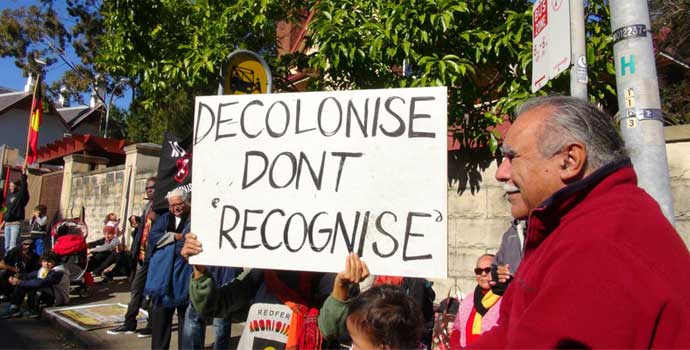
Image: Ghillar, Michael Anderson with a group of First Nations people protesting outside a meeting where Former PM Tony Abbott and Opposition Leader Bill Shorten met with government hand-picked Aboriginal assimilationists in a closed Constitution 'Recognition' meeting in 2016 at Kirribilli House in Sydney,
At present we are loosing this fight and we permit ourselves to be referred to as a 'past ancient culture', which was the 'oldest continuing culture' on earth, and some of our people now act as tourist exhibits with a song and dance routine. Our culture has been prostituted for financial gain. This is to be colonised. To change this means we must decolonise our mind and our practices to that of being proud owners of the oldest living culture on the earth and who retain to this day our own national identity and the right to be called by our own nationality, that is Ngoongar, Gomeroi, Wiradjuri, Murrawarri and Euahlayi, etc."
Convener of the Sovereign Union, last surviving member of the founding four of the Aboriginal Embassy and Head of State of the Euahlayi Peoples Republic

